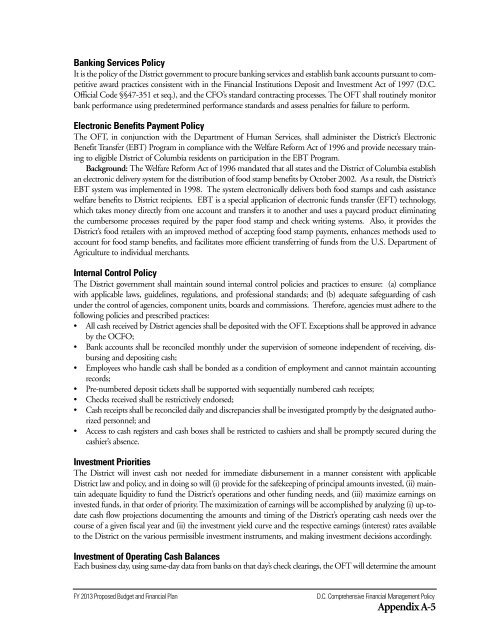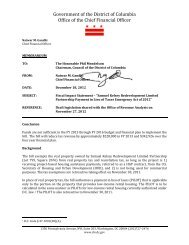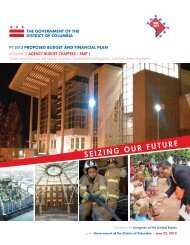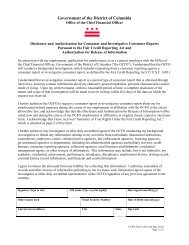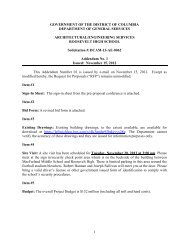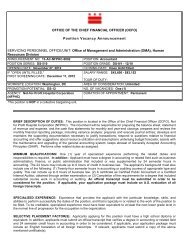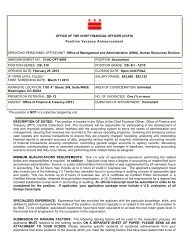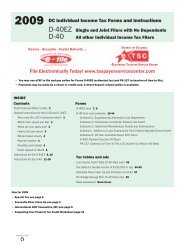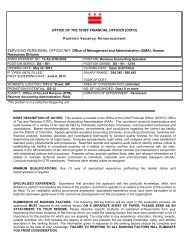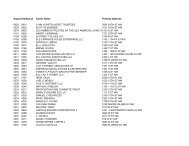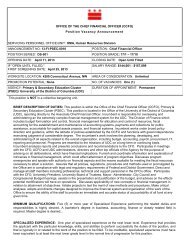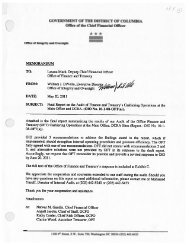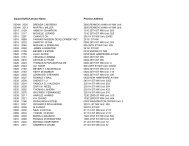Volume 1 - Executive Summary - Office of the Chief Financial Officer
Volume 1 - Executive Summary - Office of the Chief Financial Officer
Volume 1 - Executive Summary - Office of the Chief Financial Officer
You also want an ePaper? Increase the reach of your titles
YUMPU automatically turns print PDFs into web optimized ePapers that Google loves.
Banking Services Policy<br />
It is <strong>the</strong> policy <strong>of</strong> <strong>the</strong> District government to procure banking services and establish bank accounts pursuant to competitive<br />
award practices consistent with in <strong>the</strong> <strong>Financial</strong> Institutions Deposit and Investment Act <strong>of</strong> 1997 (D.C.<br />
Official Code §§47-351 et seq.), and <strong>the</strong> CFO’s standard contracting processes. The OFT shall routinely monitor<br />
bank performance using predetermined performance standards and assess penalties for failure to perform.<br />
Electronic Benefits Payment Policy<br />
The OFT, in conjunction with <strong>the</strong> Department <strong>of</strong> Human Services, shall administer <strong>the</strong> District’s Electronic<br />
Benefit Transfer (EBT) Program in compliance with <strong>the</strong> Welfare Reform Act <strong>of</strong> 1996 and provide necessary training<br />
to eligible District <strong>of</strong> Columbia residents on participation in <strong>the</strong> EBT Program.<br />
Background: The Welfare Reform Act <strong>of</strong> 1996 mandated that all states and <strong>the</strong> District <strong>of</strong> Columbia establish<br />
an electronic delivery system for <strong>the</strong> distribution <strong>of</strong> food stamp benefits by October 2002. As a result, <strong>the</strong> District’s<br />
EBT system was implemented in 1998. The system electronically delivers both food stamps and cash assistance<br />
welfare benefits to District recipients. EBT is a special application <strong>of</strong> electronic funds transfer (EFT) technology,<br />
which takes money directly from one account and transfers it to ano<strong>the</strong>r and uses a paycard product eliminating<br />
<strong>the</strong> cumbersome processes required by <strong>the</strong> paper food stamp and check writing systems. Also, it provides <strong>the</strong><br />
District’s food retailers with an improved method <strong>of</strong> accepting food stamp payments, enhances methods used to<br />
account for food stamp benefits, and facilitates more efficient transferring <strong>of</strong> funds from <strong>the</strong> U.S. Department <strong>of</strong><br />
Agriculture to individual merchants.<br />
Internal Control Policy<br />
The District government shall maintain sound internal control policies and practices to ensure: (a) compliance<br />
with applicable laws, guidelines, regulations, and pr<strong>of</strong>essional standards; and (b) adequate safeguarding <strong>of</strong> cash<br />
under <strong>the</strong> control <strong>of</strong> agencies, component units, boards and commissions. Therefore, agencies must adhere to <strong>the</strong><br />
following policies and prescribed practices:<br />
• All cash received by District agencies shall be deposited with <strong>the</strong> OFT. Exceptions shall be approved in advance<br />
by <strong>the</strong> OCFO;<br />
• Bank accounts shall be reconciled monthly under <strong>the</strong> supervision <strong>of</strong> someone independent <strong>of</strong> receiving, disbursing<br />
and depositing cash;<br />
• Employees who handle cash shall be bonded as a condition <strong>of</strong> employment and cannot maintain accounting<br />
records;<br />
• Pre-numbered deposit tickets shall be supported with sequentially numbered cash receipts;<br />
• Checks received shall be restrictively endorsed;<br />
• Cash receipts shall be reconciled daily and discrepancies shall be investigated promptly by <strong>the</strong> designated authorized<br />
personnel; and<br />
• Access to cash registers and cash boxes shall be restricted to cashiers and shall be promptly secured during <strong>the</strong><br />
cashier’s absence.<br />
Investment Priorities<br />
The District will invest cash not needed for immediate disbursement in a manner consistent with applicable<br />
District law and policy, and in doing so will (i) provide for <strong>the</strong> safekeeping <strong>of</strong> principal amounts invested, (ii) maintain<br />
adequate liquidity to fund <strong>the</strong> District’s operations and o<strong>the</strong>r funding needs, and (iii) maximize earnings on<br />
invested funds, in that order <strong>of</strong> priority. The maximization <strong>of</strong> earnings will be accomplished by analyzing (i) up-todate<br />
cash flow projections documenting <strong>the</strong> amounts and timing <strong>of</strong> <strong>the</strong> District’s operating cash needs over <strong>the</strong><br />
course <strong>of</strong> a given fiscal year and (ii) <strong>the</strong> investment yield curve and <strong>the</strong> respective earnings (interest) rates available<br />
to <strong>the</strong> District on <strong>the</strong> various permissible investment instruments, and making investment decisions accordingly.<br />
Investment <strong>of</strong> Operating Cash Balances<br />
Each business day, using same-day data from banks on that day’s check clearings, <strong>the</strong> OFT will determine <strong>the</strong> amount<br />
FY 2013 Proposed Budget and <strong>Financial</strong> Plan<br />
D.C. Comprehensive <strong>Financial</strong> Management Policy<br />
Appendix A-5


